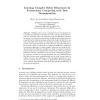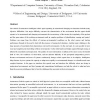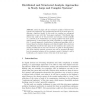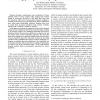1019 search results - page 5 / 204 » Managing Complexity in Large Learning Robotic Systems |
EWLR
1997
Springer
13 years 11 months ago
1997
Springer
Building robots can be a tough job because the designer has to predict the interactions between the robot and the environment as well as to deal with them. One solution to cope the...
ISCI
2002
2002
Intelligent learning and control of autonomous robotic agents operating in unstructured environments
13 years 6 months ago
The control of autonomous intelligent robotic agent operating in unstructured changing environments includes many objective difficulties. One major difficulty concerns the charact...
ICRA
2010
IEEE
13 years 5 months ago
2010
IEEE
— Reinforcement learning (RL) is one of the most general approaches to learning control. Its applicability to complex motor systems, however, has been largely impossible so far d...
EEF
2000
13 years 10 months ago
2000
Both the logic and the stochastic analysis of discrete-state systems are hindered by the combinatorial growth of the state space underlying a high-level model. In this work, we con...
IROS
2008
IEEE
14 years 1 months ago
2008
IEEE
—Dynamic system-based motor primitives [1] have enabled robots to learn complex tasks ranging from Tennisswings to locomotion. However, to date there have been only few extension...




